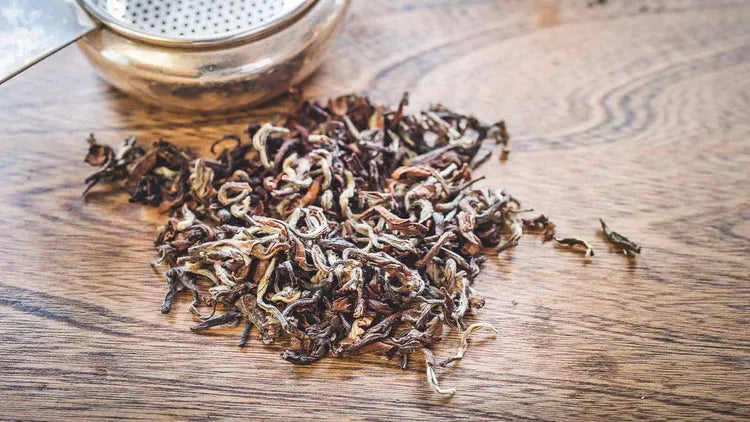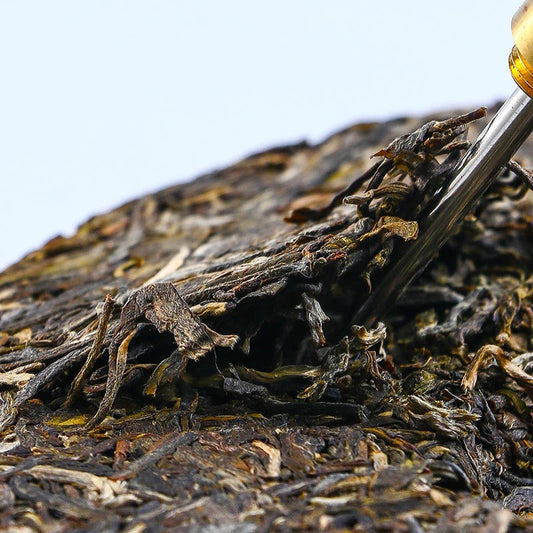Overview
Do you know how much Health Benefits does Black Tea gives you?
Black tea is known for its healthy components as well as its rich flavour. It also has a unique processing. This article guides you through about What is black tea, health benefits, risks, is it safe to consume daily, how much can we consume daily. And at last you will have an detailed knowledge of Black tea.
Table of content
- Introduction
- What is Black tea
- 5 Health Benefits of Black Tea
- Risks Of excessive Consumption
- Can we Drink Black tea daily?
- How much Can we drink daily
- Conclusion
Introduction
Black tea has been appreciated for its bold flavour and energising effects. However, what many people doesn't know that this popular beverage also provides numerous health benefits. Moreover, it contains powerful antioxidants and compounds that promote overall wellness. While green tea often steals the spotlight for health enthusiasts, black tea deserves equal attention for its unique benefits.
What is Black Tea?
Black tea comes from the same plant as green, white, and oolong tea the Camellia sinensis. The difference between them is in how the tea leaves are processed. After harvesting, the leaves undergo full oxidation, which is why this tea has a darker colour and a richer flavour compared to other teas. The oxidation process makes the tea different and this also influences its health benefits. The longer oxidation results in higher concentrations of certain compounds, such as flavonoids and theaflavins, which contribute to its health-boosting properties. This tea is commonly enjoyed hot or cold, plain or with additives like milk, lemon, or sweeteners, depending on personal preferences.

5 Health Benefits of Black tea
The health benefits of green tea is also similar to this tea. But there are some differences.
1. Supports Heart Health
It is rich in flavonoids, which are a type of antioxidant. These flavonoids are known to improve heart health by reducing inflammation and lowering cholesterol levels. According to studies, regular consumption of this tea may reduce the risk of heart disease by improving the function of blood vessels and lowering blood pressure. Flavonoids in this tea can also help in reducing the build-up of plaque in the arteries, which reduces the risk of stroke.
2. Boosts Mental Alertness
One of the most well-known benefits of this tea is its ability to enhance mental alertness and concentration. The caffeine content provides a mild stimulating effect, which can help improve focus and reduce feelings of fatigue. Unlike coffee, it provides a more gradual and sustained energy boost without the jitters that can sometimes accompany a high dose of caffeine. Additionally, black tea contains L-theanine, an amino acid that promotes relaxation and alertness at the same time. This combination of caffeine and L-theanine creates a balanced state of mental alertness without causing overstimulation.
3. Promotes Digestive Health
It contains tannins, which are compounds known for their astringent properties. These tannins can have a positive effect on your digestive system, as they help in the intestinal lining and reduce inflammation. Drinking this tea can aid in digestion, especially after a heavy meal. Research also suggests that the polyphenols promote the growth of beneficial bacteria in the gut while inhibiting harmful bacteria. This helps maintain a balanced gut microbiome, which is crucial for overall health and immunity.
4. Aids in Weight Management
If you’re looking to manage your weight, black tea can be a helpful addition to your diet. The flavonoids have been linked to weight loss and fat distribution. Drinking this tea may help boost metabolism and assist in the breakdown of fat. It’s also a low-calorie beverage, making it a good alternative to sugary drinks. A study found that it promotes weight loss by altering the bacteria in the gut. This research indicates that this tea encourages the growth of good bacteria that play a role in regulating metabolism and fat storage.
5. Provides Antioxidant Protection
Antioxidants are vital for protecting the body against free radical damage. It contains powerful antioxidants, such as theaflavins and catechins, which help neutralise free radicals in the body. These antioxidants can help prevent chronic diseases like cancer and diabetes by reducing oxidative stress. Moreover, the antioxidants in this tea can also improve skin health by fighting premature ageing. Regular consumption of black tea may help reduce the appearance of wrinkles and protect against sun damage due to the high level of polyphenols.
Risks of Excessive Consumption
While black tea offers a lot of benefits, like any good thing, it’s important to consume it in moderation. Excessive consumption can lead to some side effects due to its caffeine content and other compounds like tannins and oxalates. However, other teas such as green tea can also cause some side effects due to excessive consumption. Let’s break down the main risks of excessive consumption.
1. Caffeine Overload
It contains moderate levels of caffeine, which helps to boost alertness and energy. However, consuming too much caffeine can have several negative side effects. Drinking more than four or five cups of this tea per day may lead to symptoms like jitters, insomina, and racing heart. For individuals sensitive to caffeine, even small amounts from this tea may cause these symptoms. Therefore, moderation is key.
2. Iron Absorption Issues
Drinking it too much can make issues on iron absorption. Tannins are a type of polyphenol that give black tea its slightly astringent taste, but they also have the ability to bind to iron in the digestive system. This can reduce the body’s ability to absorb non-heme iron.
For most people, this isn’t a huge concern, but people with iron deficiency or anaemia, excessive consumption could worsen the issue. To mitigate this risk, consider drinking tea between meals.
3. Kidney Stones
Another risk of excessive black tea consumption is the potential for kidney stone formation. Black tea contains oxalates, which are compounds that can contribute to the development of kidney stones in some individuals. Oxalates bind with calcium in the kidneys, forming hard deposits known as kidney stones.
A diet high in oxalates, combined with inadequate hydration, can increase the risk of kidney stones, especially in individuals prone to developing them. Although drinking black tea in moderation is unlikely to cause this issue. Excessive consumption, especially if you're not staying hydrated, may increase your risk.
4. Staining Teeth
Black tea can lead to the discolouration of teeth over time due to its high tannin content. While tea may not be as aggressive as coffee when it comes to staining teeth, drinking multiple cups of black tea a day without proper oral hygiene can cause yellowing of the enamel. If you’re a regular black tea drinker, you might notice gradual staining, especially along the gum line and in areas where plaque builds up. To combat this, ensure you maintain good oral hygiene practices such as brushing and flossing regularly, and consider drinking your tea through a straw to minimise contact with your teeth. Alternatively, adding milk to your tea can help reduce the staining potential.
Can We Drink Black Tea Daily?
Yes, black tea can be enjoyed as part of your daily routine. In fact, many people around the world drink black tea regularly as part of their cultural traditions or personal preference. When consumed in moderation, black tea offers a range of benefits without the associated risks. A moderate intake of black tea can improve your energy levels, support your heart health, and even aid in weight management.
However, if you’re sensitive to caffeine or have conditions like anaemia or kidney issues, it’s important to monitor your intake and consult with a healthcare provider if necessary. For most people, drinking 2 to 4 cups a day is perfectly safe and beneficial.
How Much Can We Drink Daily?
The ideal amount of black tea consumption varies from person to person, depending on individual tolerance to caffeine and overall health status. As a general guideline:
1. 2 to 4 cups per day:
For most people, this range provides the health benefits of this tea without overwhelming the body with caffeine or other compounds like oxalates or tannins.
2. Limit caffeine intake:
Remember, the total recommended daily caffeine intake is around 400 milligrams for most adults. A cup of black tea contains approximately 40-70 milligrams of caffeine, so drinking up to 5 cups of black tea daily stays within safe limits for caffeine.
3. Monitor your body’s response:
If you start to notice side effects like difficulty sleeping, jitteriness, or digestive discomfort, it may be a sign to slow down.
Ultimately, the best approach is to balance your consumption with your body's needs, ensuring that you get the benefits while avoiding potential risks.

Conclusion
Black tea offers a wide range of benefits and also can be some problematic if not consumed on recommend levels. It is safe to drink daily in moderation. We have discussed about this tea in detail. Now we know how much Health benefit it gives us. Green tea is mainly known for its potential health benefits but black tea also has many benefits so you can also consider this too. This is a great choice for anyone who is looking to get a rich tea experience with a lot of benefits. If you are looking to expand your tea knowledge then try Pu-erh tea which is a rich tea which gets better with age.
Q&A Section
Q1. Is black tea good for heart health?
A1. Yes, black tea is beneficial for heart health due to its flavonoids, which can help reduce cholesterol levels and improve blood vessel function. Regular consumption may lower the risk of heart disease.
Q2. Can black tea help with digestion?
A2. Black tea contains tannins that can aid digestion by soothing the digestive tract and promoting gut health. It may also help reduce inflammation in the gut.
Q3. How does black tea compare to coffee in caffeine content?
A3. Black tea contains less caffeine than coffee, with about 40-70 milligrams per cup compared to 95-200 milligrams in a cup of coffee. This makes it a milder option for those sensitive to caffeine.






